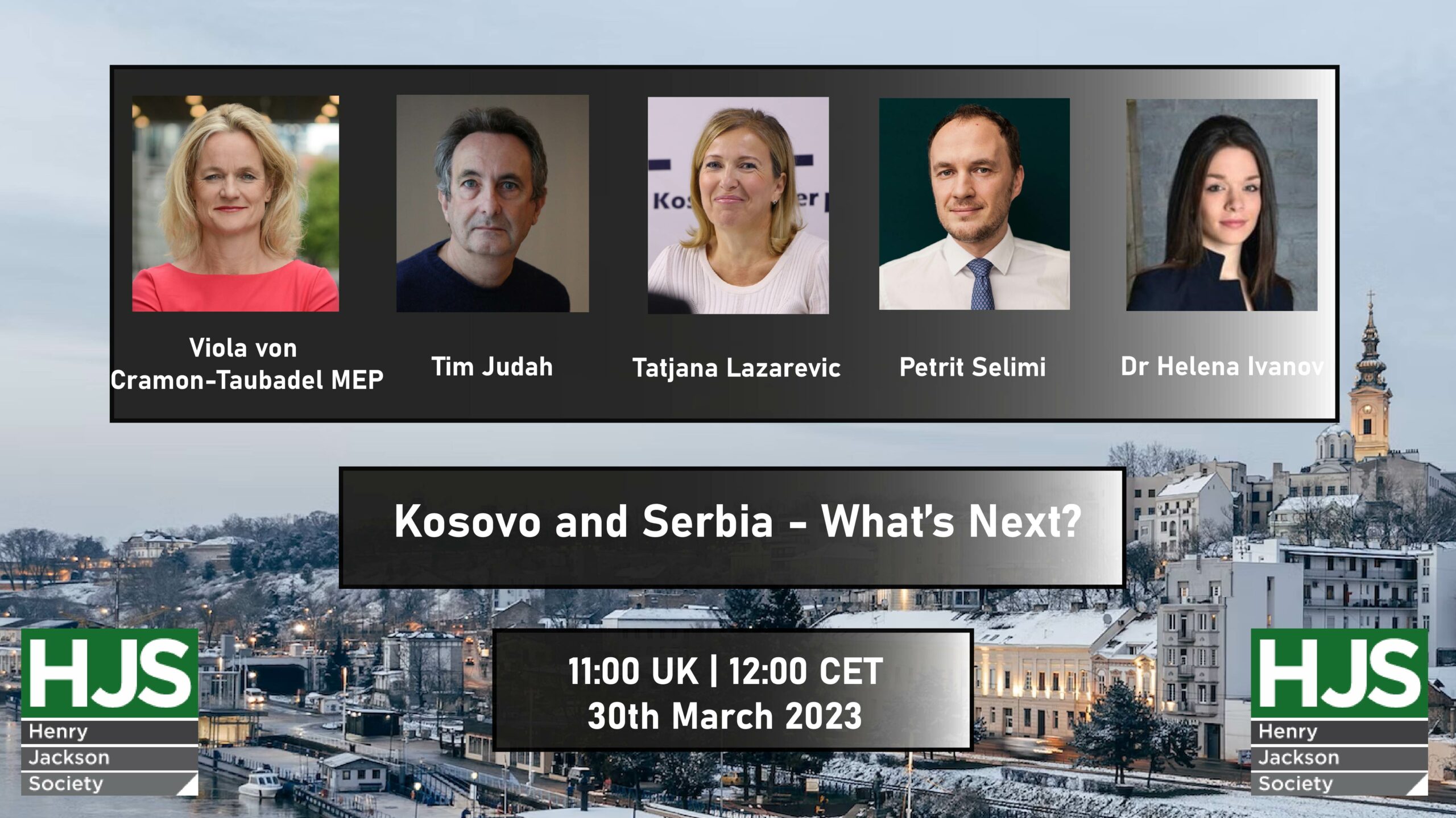Kosovo and Serbia – What’s Next?

- This event has passed.
Kosovo and Serbia – What’s Next?
30th March 2023 @ 11:00 am - 12:00 pm

25 years have passed since the outbreak of war in Kosovo. 24 years have passed since NATO launched its military operation in Yugoslavia in the attempt to end the war in Kosovo. 15 years have passed since Kosovo declared independence from Serbia in February 2008.
And despite everyone’s efforts, the situation remains as complicated as ever. Serbia refuses to recognise Kosovo as an independent state, with Serbian President Aleksandar Vucic making it clear that Serbia will not allow Kosovo to join the UN or grant Kosovo the recognition it seeks.
Kosovo on the other hand, refuses to implement aspects of the Brussels treaty signed in 2013, with Kosovo PM Albin Kurti explicitly rejecting the creation of the Association of Serb Municipalities in Kosovo.
Following Russia’s invasion of Ukraine, there have been increasing concerns about the sustainability of peace in Kosovo, partly due to Russia’s involvement in the region. Contributing to these fears were also flare ups in the second half of 2022 caused by disagreements about travel documents and car registration plates. In January 2023, things culminated when, on Orthodox Christmas Eve, a gunman shot and wounded two Serbs, one an 11-year-old child in Kosovo.
While a new EU proposal has been accepted in Brussels in February 2023, hopes remain low that any viable solution will be found as the two sides continue to disagree on how to implement the deals they notionally accepted.
What is the way out of this? Can these two states find a viable model of co-existence? What is Russia’s role in all of this? What can and should the international community do? These are some of the questions that we plan to address during the panel.
The Henry Jackson Society is pleased to gather the panel of leading experts to discuss the relationship between the states of Kosovo and Serbia and the ways out of the stalemate and confrontation.

Viola von Cramon-Taubadel was elected as a Member of the European Parliament in 2019 and belongs to the Group of The Greens/European Free Alliance. Since her election, she has been serving on the Committee on Foreign Affairs and as a substitute in the Committees on Industry, Research and Energy and on Budget Control. Since July 2020, she is also member of the Special Committee on Foreign Interference in all Democratic Processes in the European Union, including Disinformation.
In addition to her committee assignments, she is the First Vice-Chair of the EP’s delegation to the EU-Ukraine Parliamentary Association Committee, member of the EU-Serbia delegation and to the EURONEST Parliamentary Assembly as well as a substitute member to the EU-Russia Parliamentary Cooperation Committee.
Prior to her EP mandate, she represented Lower Saxony in the German federal parliament (Bundestag) from 2009 to 2013 where she was the spokesperson for EU foreign relations and for sports policy. Already during her studies of agricultural economics, she worked in international projects in Russia, Belarus, Ukraine, Estonia, Poland and China. Ms. von Cramon was the Green’s spokesperson for the Green State Working Group on Consumer Protection, Food and Agriculture and later in the same function in the State Working Group on Europe and International Policy.

Tim Judah is a journalist and author and covers the Balkans and other regions as a correspondent for The Economist.
He has worked for many major publications and broadcasters, notably writing wartime reportage from Afghanistan to Ukraine for the New York Review of Books.
For much of the last year he has been in Ukraine covering the conflict for the New York Review of Books and The Economist plus a series for the Financial Times. He was shortlisted for the 2022 Bayeux-Calvedos award for war correspondents.
He is the author of three books on the Balkans—The Serbs: History, Myth and the Destruction of Yugoslavia, Kosovo: War & Revenge and Kosovo: What Everyone Needs to Know—and published a book on the conflict in Ukraine – In Wartime: Stories from Ukraine in 2016.
From 1990 to 1991, Judah lived in Bucharest and covered the aftermath of communism in Romania and Bulgaria for The Times and The Economist. After that, he moved to Belgrade for both publications in order to cover the war in Yugoslavia. He moved back to London in 1995 but continues to travel to the region frequently.
In 2009 he was a Senior Visiting Research Fellow at LSEE, the south-east Europe research unit of the European Institute at the London School of Economics, where he developed the concept of the ‘Yugosphere’.
As a fellow of the Europe’s Futures project of the Institute for Human Sciences / IWM in Vienna he has been researching demography and depopulation in central and eastern Europe and the Balkans. Between 2019-22 he published a series of 28 articles on the topic on the Balkan Insight / Reporting Democracy and the Erste Stiftung websites, as well as articles in The Economist and elsewhere.
He is the president of the boards of the Balkan Investigative Reporting Network (BIRN) and the Kosovar Stability Initiative (IKS).
Over the past two decades, Judah has worked around the world for The Economist, the New York Review of Books and others. He has notably reported from countries such as Afghanistan, Iraq, Iran, Madagascar, Niger, Senegal, Sudan, North Korea, Darfur, Haiti, France and Armenia.
In 2008 he published Bikila: Ethiopia’s Barefoot Olympian for Reportage Press about the life and times of the first black African to win a gold medal at the 1960 Olympics in Rome, which led him to be shortlisted in the ‘best new sportswriter’ category of the 2009 British Sports Book Awards.

Tatjana Lazarevic is a native of Mitrovica. Ms Lazarevic is the editor of the media and news outlet, Kosovo North Portal – KoSSev (www.kossev.info), the leading (until recently also the youngest) Kosovo Serbian speaking media with the current audience of nearly two million page views per month. Her university education background is in philology, public relations and communication. Ms Lazarevic has extensive working experience in teaching, communication/journalism and civic engagement. She is the author of a series academic and expert papers in communication, author of numerous analytical&journalistic articles on political situation in Kosovo (with a focus on North Kosovo and Kosovo Serbs in general). Tatjana Lazarevic was named Person of the Year in 2018 by a majority of votes by the editorial staff of the Belgrade-based weekly news magazine „Vreme“. As in previous years, the contribution to the advancement of institutions in the public interest was taken as the criterion for the award. The editorial staff of KoSSev portal won the „Dusan Bogavac“ journalistic award for ethics and courage for 2018. The KoSSev portal was the 28th recipient of this award, which has been awarded since 1991. Tatjana Lazarevic also won the prestige „Stanislav Stasa Marinkovic“ award for journalistic courage and special achievements in research and analytical journalism for 2019, traditionally awarded by the Belgrade-based Danas daily. Just recently she was awarded order of the Knight of the (French) National Order of Merit.

Petrit Selimi is the former foreign minister of Kosovo. He is currently engaged in public and private sector initiatives in renewable energy and energy transition and is active in public discussions on Kosovo’s key challenges, including dialogue with Serbia. After serving as Kosovo’s deputy foreign minister (2011-2016) and foreign minister (2016), Petrit has worked for over five years as the CEO of Millennium Foundation Kosovo, the country’s biggest non-profit organization financed by a $49million US federal grant from MCC, focused on energy, gender inclusion and environment.
Prior to these engagements, Petrit has been founder and leader of several civic, cultural and private initiatives, including being founding CEO and publisher of Gazeta Express, Kosovo’s biggest online media; member of the Board of Directors of Open Society Fund and President Ahtisaari’s Balkan Children and Youth Foundation.
Petrit has won global awards for his work in digital diplomacy, global interfaith dialogue, etc. He has studied for BA at University of Oslo and MA at London School of Economics. He has written for and has been profiled for global media outlets including Time, The Guardian, The New York Times, Wired magazine, The Times of London, BBC, etc. Petrit is active on Twitter and speaks fluently Albanian, English, Norwegian and south Slavic languages.

Dr Helena Ivanov is an associate research fellow at the Henry Jackson Society. She recently completed a PhD in International Relations at the London School of Economics and Political Science. Her research focuses on the relationship between propaganda and violence against civilians. In her thesis, Helena examined the role propaganda played during the Yugoslav Wars and produced a model for studying propaganda which details the key phases, functions, discourses, and techniques of propaganda (the model itself is applicable to other contexts). Additionally, Helena also served as a Manager at the Centre for International Studies at the LSE.
Prior to her PhD, Helena completed an MPhil in Political Theory at the University of Oxford, and holds a BA in Politics from the University of Belgrade.
***
EVENT SUMMARY
The Henry Jackson Society was pleased to host a discussion on the last 25 years of Kosovo-Serbia relations, the present barriers to diplomacy, and the future possibility of a lasting peace. Dr. Helena Ivanov opened the discussion with a brief summary of Kosovar-Serbian relations since the NATO intervention of Spring 1999. Dr. Ivanov argued that relations remain tense, with Serbia refusing to recognize the autonomy of Kosovo, and Kosovo refusing to consider the independent political identity of Ethnic Serbians residing within Kosovo’s declared borders. Dr. Ivanov invited the panelists to comment on the recent EU backed March 18th agreements attempting to normalize relations between the two countries. Tim Judah remained unconvinced that the unsigned, non-binding, agreement would meaningfully resolve differences, but belied that they could temporarily cool tensions and encourage further dialogue. Tatjana Lazarevic agreed, arguing that the formal diplomatic process is heavily dependent on the situation on the ground, and that there are not strong enough incentives for political leaders to engage each other in good faith at the risk of alienating their domestic constituencies. Petrit Selimi stated that mutual recognition on equal terms is not in dispute, but that the status of the Serbian population of Kosovo represents an obstacle to diplomacy that will not easily be resolved through bilateral negotiations alone. Both Mr. Selimi and Mrs. Cramon-Taubadel agreed that Kosovar acceptance and participation in recognized International organizations such as the European Convention on Human Rights, the World Health Organization, and UNESCO, would encourage formalized working relations between Kosovo and Serbia.
RELATED EVENTS
British General Election Campaigns 1830-2019: Can The Past Inform The Future?”
The British general election is the linchpin of our liberal democracy, and its results are often fundamental to how we live. With the next UK general election looming, there is therefore … Continued



